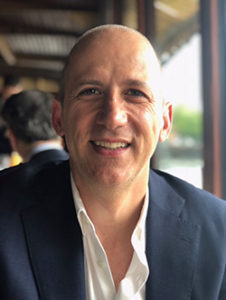
James Berkeley
James Berkeley is a retired Wall Street trader who is working on his game at The Bridge Golf Learning Center with Teaching Professional Brian Hwang. He recently fielded some questions from Executive Director and Co-Founder Farrell Evans.
FE: How did you get into golf?
JB: I didn’t start playing until my mid 20s, when I went to business school. I loved it but didn’t pursue it after moving to New York. That changed when I had children. I wanted to expose them to it early, and that gave me a great excuse to really start playing the game.
FE: What was it like growing up in Portland, Oregon?
JB: I moved from England to Oregon when I was 10, as my father looked to grow his medical career in the U.S. Growing up in Portland was amazing. I had never lived someplace where people were so health-conscious and focused on good food. The ability to do so many activities outdoors was truly unique. I grew up running track and cross-country and ran competitively all through high school. It was a great foundation for all the sports I did in my life.
FE: Tell us about your experience so far working with Brian Hwang in the Learning Center. What are you learning and how has it helped you?
JB: Working with Brian has been an eye-opening experience. Most of the other lessons I have taken were just a pro standing behind me and telling me to correct a few things without any visual aids. Brian’s use of technology and his ability to break down the swing have allowed me to understand for the first time in my life what my swing should look like, while at the same time teaching me how to practice the right way. He has simplified the components of my swing while giving me a very technical understanding of the correct body position. I am working very hard now to ingrain what I’ve learned to become more consistent.
FE: You recently retired from a very successful career on Wall Street. Is there anything you miss about it?
JB: I started on Wall Street in 1989 and truly had an amazing career. I miss the day-to-day interactions with colleagues and friends. I also miss the mornings where I found it a very calm period before the markets opened and a time that I had the chance to formulate strong opinions about how to advise clients on positioning their risk in changing times. But overall, I haven’t looked back and truly love the change and exploring new avenues.
FE: Are there any parallels between trading and golf?
JB: I would say the one parallel is that when you sit on a trading floor you need to be able to block out all the noise and inputs around you and focus on the trade at hand. I think that is exactly the same in golf; you have to be laser-focused on the shot at hand. That’s something I am still trying to learn, to stay in the moment.
FE: At the Foundation, we are deeply invested in golf and education, but just as important are character and ethics. What have been the key ingredients that have led to your success in all areas of your life?
JB: I have always believed that you have to form long-term relationships. People on Wall Street often focus on the transaction and forget about the long-term implications to the relationship. Doing a trade that makes you money is fine, but I always believed that you were there to form a relationship for 10 to 15 years and needed to advise people when something wasn’t good for them. That is more valuable over time than the one transaction you might have missed.
I always believed you should follow simple basic mottos. A few that I thought about every day. ABS – always be smiling. ABH – always be honest. ABG – always be giving. Time kills deals. And, Change the dynamic when something isn’t working
FE: What was the last book you read?
JB: Camino Island by John Grisham.
FE: What’s your dream foursome?
JB: Gary Player, Tom Watson, Tiger Woods, Rickie Fowler.
FE: What are your long-term goals as a golfer?
JB: I want to create a great deal more consistency in my swing and get to a single-digit handicap
FE: If there were only one global problem you could solve, what would it be?
JB: It would have to be cancer because I had colorectal cancer 3 years ago, with no history in my family. I want to see research and technology find the solution.
FE: Your 13-year-old son, Aidan, also works with Brian. How long will it be before he’s beating you?
JB: If he continues at his current rate, he will be beating me by later this year or next spring. That is why I am working so hard on my game.